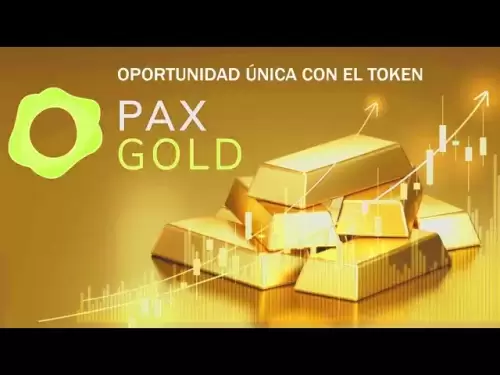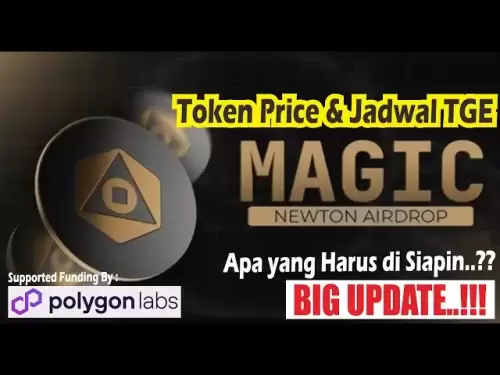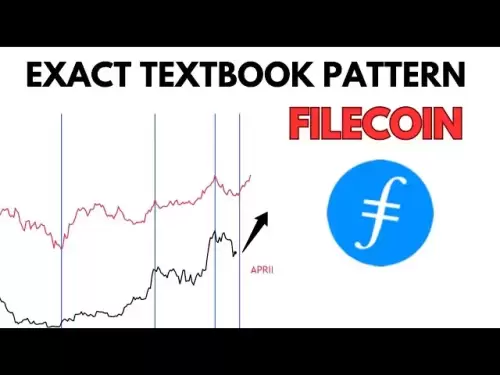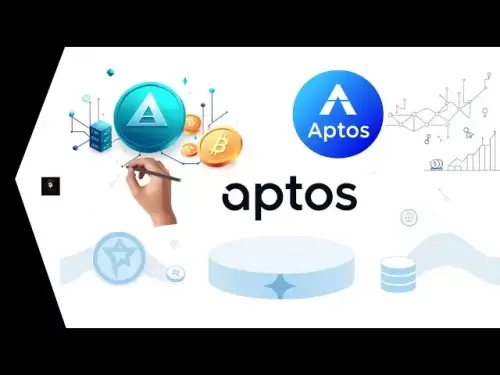-
 Bitcoin
Bitcoin $99,594.2189
-3.59% -
 Ethereum
Ethereum $2,188.5793
-9.00% -
 Tether USDt
Tether USDt $1.0001
-0.02% -
 XRP
XRP $1.9745
-5.82% -
 BNB
BNB $608.9511
-3.73% -
 Solana
Solana $130.4575
-5.93% -
 USDC
USDC $1.0000
0.01% -
 TRON
TRON $0.2637
-3.59% -
 Dogecoin
Dogecoin $0.1493
-5.97% -
 Cardano
Cardano $0.5322
-6.72% -
 Hyperliquid
Hyperliquid $33.9044
3.33% -
 Bitcoin Cash
Bitcoin Cash $449.6411
-5.46% -
 UNUS SED LEO
UNUS SED LEO $8.9629
0.43% -
 Sui
Sui $2.3943
-8.35% -
 Chainlink
Chainlink $11.4402
-7.83% -
 Stellar
Stellar $0.2241
-6.49% -
 Avalanche
Avalanche $16.1489
-4.24% -
 Toncoin
Toncoin $2.7182
-5.94% -
 Shiba Inu
Shiba Inu $0.0...01040
-5.72% -
 Litecoin
Litecoin $78.7882
-4.07% -
 Ethena USDe
Ethena USDe $1.0004
-0.01% -
 Hedera
Hedera $0.1305
-7.45% -
 Monero
Monero $297.0030
-5.32% -
 Dai
Dai $0.9997
-0.02% -
 Polkadot
Polkadot $3.1834
-6.03% -
 Bitget Token
Bitget Token $3.9788
-7.03% -
 Uniswap
Uniswap $6.1327
-10.62% -
 Pepe
Pepe $0.0...08689
-8.30% -
 Pi
Pi $0.4826
-9.65% -
 Aave
Aave $219.8043
-9.69%
Is Bitcoin arbitrage across exchanges possible? Is it difficult?
Bitcoin arbitrage is possible but challenging due to transaction speed, fees, and regulatory differences across exchanges.
May 19, 2025 at 03:28 pm
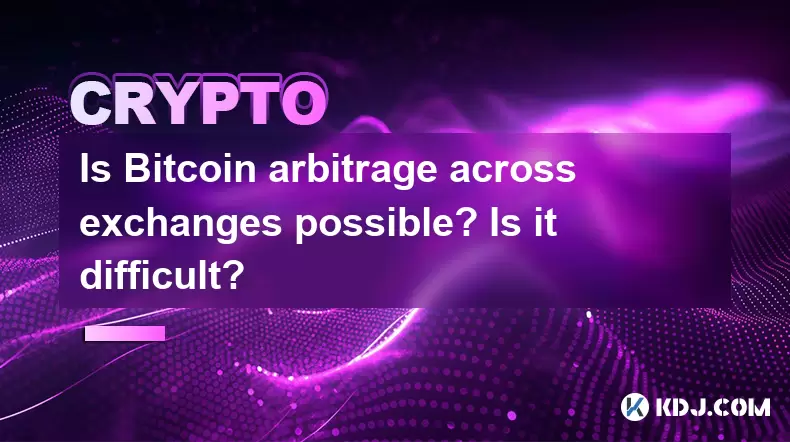
Is Bitcoin arbitrage across exchanges possible? Is it difficult?
Bitcoin arbitrage across exchanges is indeed possible and involves taking advantage of price differences for Bitcoin across different cryptocurrency exchanges. The concept is straightforward: buy Bitcoin on an exchange where it is cheaper and sell it on another where the price is higher. However, the feasibility and difficulty of executing this strategy depend on several factors, including the speed of transactions, transfer fees, and the ability to quickly move funds between exchanges.
Understanding Bitcoin Arbitrage
Bitcoin arbitrage is the practice of exploiting price differences of Bitcoin across different exchanges. This can be done in various forms, including spatial arbitrage, where the price difference exists between different geographical locations, and cross-exchange arbitrage, where the price difference is between different trading platforms. The goal is to profit from the price discrepancies that can occur due to market inefficiencies.
Factors Affecting Bitcoin Arbitrage
Several factors can impact the success of Bitcoin arbitrage. Transaction speed is crucial because prices can change rapidly, and delays can turn a profitable opportunity into a loss. Transfer fees also play a significant role, as high fees can eat into the arbitrage profits. Additionally, exchange withdrawal and deposit limits can restrict the amount of Bitcoin that can be moved, affecting the scale of arbitrage operations. Regulatory differences between countries can also impact arbitrage strategies, as some regions may have stricter rules governing cryptocurrency transactions.
Tools and Techniques for Bitcoin Arbitrage
To effectively engage in Bitcoin arbitrage, traders often use arbitrage bots and software. These tools can automatically detect price differences across exchanges and execute trades to capitalize on these opportunities. API integration is essential for these bots to interact with different exchanges seamlessly. Additionally, manual arbitrage is possible, though it requires constant monitoring of prices and quick decision-making.
Steps to Execute Bitcoin Arbitrage
If you decide to engage in Bitcoin arbitrage, here are the steps you might follow:
- Identify Price Discrepancies: Use tools or manually check the prices of Bitcoin on different exchanges to find significant differences.
- Select Exchanges: Choose exchanges with the most favorable conditions, considering factors like fees, withdrawal limits, and transaction speed.
- Transfer Funds: Move the necessary funds to the exchange where you plan to buy Bitcoin. Ensure you account for transfer times and fees.
- Execute Trades: Buy Bitcoin on the exchange where it is cheaper and sell it on the exchange where it is more expensive.
- Withdraw Profits: After the trades are completed, withdraw your profits to a secure wallet or another exchange.
Challenges and Risks in Bitcoin Arbitrage
While Bitcoin arbitrage can be profitable, it comes with its own set of challenges and risks. Market volatility can quickly erase potential profits if prices change before trades are completed. Technical issues such as exchange downtime or API failures can also disrupt arbitrage operations. Additionally, regulatory risks can arise if arbitrage activities are not compliant with local laws. Liquidity on smaller exchanges can be a concern, as it may be difficult to buy or sell large amounts of Bitcoin without affecting the market price.
Case Studies of Bitcoin Arbitrage
To illustrate the potential of Bitcoin arbitrage, consider the following examples:
- Case Study 1: A trader notices that Bitcoin is trading at $30,000 on Exchange A and $30,500 on Exchange B. They buy 1 Bitcoin on Exchange A and sell it on Exchange B, earning a $500 profit minus fees.
- Case Study 2: During a period of high volatility, a trader uses an arbitrage bot to automatically exploit price differences across multiple exchanges, executing hundreds of small trades and accumulating significant profits over time.
Frequently Asked Questions
Q: Can Bitcoin arbitrage be automated completely?
A: Yes, Bitcoin arbitrage can be fully automated using arbitrage bots and software that monitor price differences and execute trades automatically. However, it's important to monitor these bots to ensure they are functioning correctly and to adjust settings as needed.
Q: Is Bitcoin arbitrage legal?
A: Bitcoin arbitrage is legal in most jurisdictions, but it's essential to comply with local regulations regarding cryptocurrency trading and taxation. Always check the legal framework in your country before engaging in arbitrage.
Q: How much capital is needed to start Bitcoin arbitrage?
A: The amount of capital needed for Bitcoin arbitrage can vary widely depending on the scale of operations. Small-scale arbitrage can be started with a few thousand dollars, while larger operations may require tens of thousands or more. It's important to start with an amount you can afford to lose, given the risks involved.
Q: What are the best times to engage in Bitcoin arbitrage?
A: The best times for Bitcoin arbitrage often coincide with periods of high market volatility, such as during major news events or market corrections. However, arbitrage opportunities can arise at any time, so constant monitoring or the use of automated tools is necessary to capitalize on them.
Disclaimer:info@kdj.com
The information provided is not trading advice. kdj.com does not assume any responsibility for any investments made based on the information provided in this article. Cryptocurrencies are highly volatile and it is highly recommended that you invest with caution after thorough research!
If you believe that the content used on this website infringes your copyright, please contact us immediately (info@kdj.com) and we will delete it promptly.
- BTC, Iran Strike, and Markets: Navigating Geopolitical Tensions
- 2025-06-23 10:25:12
- MAGACOIN, Ethereum, Avalanche: A New Wave or Legacy Chains?
- 2025-06-23 10:25:12
- BlockDAG, Crypto Coins, and Leading Trends: What's Hot in 2025?
- 2025-06-23 10:45:12
- PEPE Exit, SUI Calls, and BlockDAG Coin: What's the Smart Money Doing?
- 2025-06-23 10:45:12
- Grant Cardone, Bitcoin, and Expansion: A New York State of Mind
- 2025-06-23 11:05:11
- BTC, $99K, Chaos: A Crypto Market Rollercoaster
- 2025-06-23 11:25:12
Related knowledge

How to customize USDT TRC20 mining fees? Flexible adjustment tutorial
Jun 13,2025 at 01:42am
Understanding USDT TRC20 Mining FeesMining fees on the TRON (TRC20) network are essential for processing transactions. Unlike Bitcoin or Ethereum, where miners directly validate transactions, TRON uses a delegated proof-of-stake (DPoS) mechanism. However, users still need to pay bandwidth and energy fees, which are collectively referred to as 'mining fe...

USDT TRC20 transaction is stuck? Solution summary
Jun 14,2025 at 11:15pm
Understanding USDT TRC20 TransactionsWhen users mention that a USDT TRC20 transaction is stuck, they typically refer to a situation where the transfer of Tether (USDT) on the TRON blockchain has not been confirmed for an extended period. This issue may arise due to various reasons such as network congestion, insufficient transaction fees, or wallet-rela...

How to cancel USDT TRC20 unconfirmed transactions? Operation guide
Jun 13,2025 at 11:01pm
Understanding USDT TRC20 Unconfirmed TransactionsWhen dealing with USDT TRC20 transactions, it’s crucial to understand what an unconfirmed transaction means. An unconfirmed transaction is one that has been broadcasted to the blockchain network but hasn’t yet been included in a block. This typically occurs due to low transaction fees or network congestio...

How to check USDT TRC20 balance? Introduction to multiple query methods
Jun 21,2025 at 02:42am
Understanding USDT TRC20 and Its ImportanceUSDT (Tether) is one of the most widely used stablecoins in the cryptocurrency market. It exists on multiple blockchain networks, including TRC20, which operates on the Tron (TRX) network. Checking your USDT TRC20 balance accurately is crucial for users who hold or transact with this asset. Whether you're sendi...

What to do if USDT TRC20 transfers are congested? Speed up trading skills
Jun 13,2025 at 09:56am
Understanding USDT TRC20 Transfer CongestionWhen transferring USDT TRC20, users may occasionally experience delays or congestion. This typically occurs due to network overload on the TRON blockchain, which hosts the TRC20 version of Tether. Unlike the ERC20 variant (which runs on Ethereum), TRC20 transactions are generally faster and cheaper, but during...

The relationship between USDT TRC20 and TRON chain: technical background analysis
Jun 12,2025 at 01:28pm
What is USDT TRC20?USDT TRC20 refers to the Tether (USDT) token issued on the TRON blockchain using the TRC-20 standard. Unlike the more commonly known ERC-20 version of USDT (which runs on Ethereum), the TRC-20 variant leverages the TRON network's infrastructure for faster and cheaper transactions. The emergence of this version came as part of Tether’s...

How to customize USDT TRC20 mining fees? Flexible adjustment tutorial
Jun 13,2025 at 01:42am
Understanding USDT TRC20 Mining FeesMining fees on the TRON (TRC20) network are essential for processing transactions. Unlike Bitcoin or Ethereum, where miners directly validate transactions, TRON uses a delegated proof-of-stake (DPoS) mechanism. However, users still need to pay bandwidth and energy fees, which are collectively referred to as 'mining fe...

USDT TRC20 transaction is stuck? Solution summary
Jun 14,2025 at 11:15pm
Understanding USDT TRC20 TransactionsWhen users mention that a USDT TRC20 transaction is stuck, they typically refer to a situation where the transfer of Tether (USDT) on the TRON blockchain has not been confirmed for an extended period. This issue may arise due to various reasons such as network congestion, insufficient transaction fees, or wallet-rela...

How to cancel USDT TRC20 unconfirmed transactions? Operation guide
Jun 13,2025 at 11:01pm
Understanding USDT TRC20 Unconfirmed TransactionsWhen dealing with USDT TRC20 transactions, it’s crucial to understand what an unconfirmed transaction means. An unconfirmed transaction is one that has been broadcasted to the blockchain network but hasn’t yet been included in a block. This typically occurs due to low transaction fees or network congestio...

How to check USDT TRC20 balance? Introduction to multiple query methods
Jun 21,2025 at 02:42am
Understanding USDT TRC20 and Its ImportanceUSDT (Tether) is one of the most widely used stablecoins in the cryptocurrency market. It exists on multiple blockchain networks, including TRC20, which operates on the Tron (TRX) network. Checking your USDT TRC20 balance accurately is crucial for users who hold or transact with this asset. Whether you're sendi...

What to do if USDT TRC20 transfers are congested? Speed up trading skills
Jun 13,2025 at 09:56am
Understanding USDT TRC20 Transfer CongestionWhen transferring USDT TRC20, users may occasionally experience delays or congestion. This typically occurs due to network overload on the TRON blockchain, which hosts the TRC20 version of Tether. Unlike the ERC20 variant (which runs on Ethereum), TRC20 transactions are generally faster and cheaper, but during...

The relationship between USDT TRC20 and TRON chain: technical background analysis
Jun 12,2025 at 01:28pm
What is USDT TRC20?USDT TRC20 refers to the Tether (USDT) token issued on the TRON blockchain using the TRC-20 standard. Unlike the more commonly known ERC-20 version of USDT (which runs on Ethereum), the TRC-20 variant leverages the TRON network's infrastructure for faster and cheaper transactions. The emergence of this version came as part of Tether’s...
See all articles





















